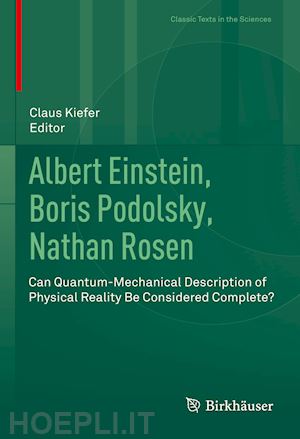

Questo prodotto usufruisce delle SPEDIZIONI GRATIS
selezionando l'opzione Corriere Veloce in fase di ordine.
Pagabile anche con Carta della cultura giovani e del merito, 18App Bonus Cultura e Carta del Docente
The work published by Einstein, Podolsky and Rosen (EPR) in 1935 is a classic in modern physics. It discusses, for the first time, the central feature of the quantum theory: entanglement. In general, systems are intertwined with each other in nature; that is, they have only one common, non-divisible state. This fact is responsible for all the oddities commonly associated with quantum theory, including the famous thought experiments with Schrödinger’s cat and Wigner’s friend. The entanglement of quantum mechanics plays a central role in experiments with atoms and photons (Nobel Prize 2012 for Haroche and Wineland) and the planned construction of quantum computers.
This book presents EPR’s original work amplified with a detailed commentary, which examines both the historical context and all aspects of entanglement. In particular, it focuses on the interpretation of quantum theory and its consequences for a basic understanding of nature.











Il sito utilizza cookie ed altri strumenti di tracciamento che raccolgono informazioni dal dispositivo dell’utente. Oltre ai cookie tecnici ed analitici aggregati, strettamente necessari per il funzionamento di questo sito web, previo consenso dell’utente possono essere installati cookie di profilazione e marketing e cookie dei social media. Cliccando su “Accetto tutti i cookie” saranno attivate tutte le categorie di cookie. Per accettare solo deterninate categorie di cookie, cliccare invece su “Impostazioni cookie”. Chiudendo il banner o continuando a navigare saranno installati solo cookie tecnici. Per maggiori dettagli, consultare la Cookie Policy.